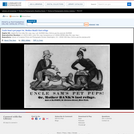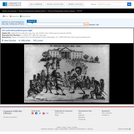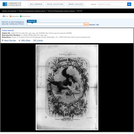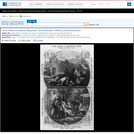A complex and somewhat obscure satire celebrating the defeat of Dorrite Democrats in the Rhode Island state elections of spring 1843. The canvass was held the year following the successful suppression of the Dorrite Rebellion, an abortive revolt against the Charter government of Rhode Island, led by Thomas Wilson Dorr. (See "Tyrants Prostrate Liberty Triumphant," no. 1844-19). Yet the 1843 Democratic slate included many radicals sympathetic to Dorr and was seen as a challenge to the reigning conservative Law and Order Party. "Trouble in the Spartan Ranks" ridicules the Dorrites on several fronts, from Dorr's enlistment of help in his cause from the Spartan Band, a New York City gang of toughs, to the makeup of their local constituency. "Old Durham" is the newly elected governor, septuagenarian James Fenner (lower right), shown as a stout man with large horns and bull's ears. He tosses the rebel leader on his horns. Dorr has one cloven hoof (a satanic attribute) and is armed with "That Sword," a prop which he employed in a famous May 1842 speech against the Charter government. He says, "Leave my Bones on Accots hill." (Acote's Hill, in the town of Chepachet, was the site of the Dorrite troop encampment at the time of their surrender in June 1842.) In the margin below, is an explanatory text phrased in mock-biblical style: Chronicles 11-1. And it came to pass anno domini 1843. A special season of humbug and fanaticism. That interlopers from Cape Cod and the Spartan Band of the Pewter Mug of York. And a few demigogues seeking office caricatured in print, the true R. Island nominee as "The Durham Bull" having horns upon his head, girth like unto the ox surly and uncouth. 2d ver. Prognosticating, Albeit that "old Durham with his horns" and the horns of Millerism would fall in disgrace together in April 1843. [For Millerism see "The Salamander Safe," no. 1843-5]. 3d ver. Mark their error and the sequel . . . Fenner is solicited by a man in a long coat on the right who says, "Lordy, Gody Govr haint I alrers been your freend. Now do for massey sake and the Corporals save the Sover-in-ity. If the Sover-inity aint in the People where is it? as Slocum says." Fenner is pointing with his whip to a banner held by a knight in armor (center) bearing the arms of the state. The banner shows Father Time, with his characteristic attributes, an hourglass and a snake grasping its own tail, and reads: "April 1843. It is Written on the Tombstone of Eternity Dorrism shall be no more in Rhode-Island." The banner hangs from a staff with an eagle and motto, "Law and Order Shall be sustained in R.I." The knight is preceded by a motley group of men with the banner, "Squad No. 2 Liberty or Oregon Delegation From 3d, 5h & 6h Wards & Burrillville." The three Providence wards and Burrillville were strongholds of reformist support. The men have their ward numbers and an initial on their hats and are no doubt Dorrite Democrats. One of the shortest and most unkempt of them, with a clay pipe protruding from his vest pocket, is an Irishman, a specimen of the new tradesmen and working-class immigrants who swelled the ranks of the reformist Democrats. Also on their banner is a black man thumbing his nose and saying, "Oregon! dats up Salt River By hokey." (The reoccupation of Oregon became an important plank in the Democratic platform of 1844.) Attached to the group is a dwarf whose trousers are torn by a dog. He is a member of the Spartan Band, carrying a flag reading, "The Banks & Beauty of Providence Spartan Band, N. York." He complains, "These Rhode Island Dogs are a pull-back to our designs and quite disorganize our fundamental arrangements." Ahead of the group is another, bearded dwarf with a drum. He has one peg leg and the other with a cloven hoof. He exhorts the group, "Go it you Algerine cripples," a phrase combining an old Democratic campaign cry with reference to the Algerine Law, an 1842 act outlawing Dorrite activity as treason. At the lower left a tiny seamstress scrutinizes through a glass a ragged, lanky tough holding a spear and clay pipe who says, "Ize one of the Spartan Band. Bee's you one of the Ladies Dorrick Circle?" Behind them is the Providence Armory, which was attacked by the Dorrites during the rebellion. It is well guarded and flies banners saying, "Law and Order the Foundation of Democracy" and "9 Cheers for Old Durham, horns and all."|C. Maolsehber del.|Entered . . . 1843 by Wm. Andrews . . . Massachusetts.|Thayer & Co's. Lith. Boston.|The Library's impression of the print was deposited for copyright on April 29, 1843, three weeks after the elections. The publisher's imprint has been trimmed off. Weitenkampf mentions two editions of the print in the American Antiquarian Society collections.|Title appears as it is written on the item.|Murrell, p. 160, 162.|Weitenkampf, p. 73.|Forms part of: American cartoon print filing series (Library of Congress)|Published in: American political prints, 1766-1876 / Bernard F. Reilly. Boston : G.K. Hall, 1991, entry 1843-6.
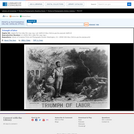
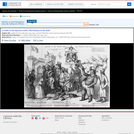
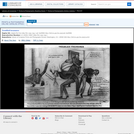
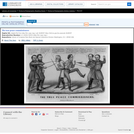
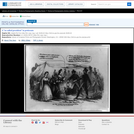
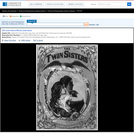
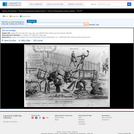
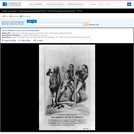
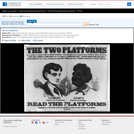
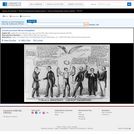
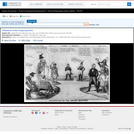
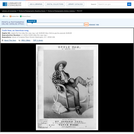
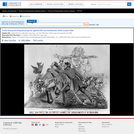
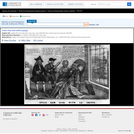
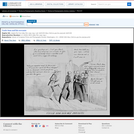
![[Uncle Sam's Menagerie]](https://img.oercommons.org/160x134/oercommons/media/upload/materials/screenshots/materials-course-76021.png)
